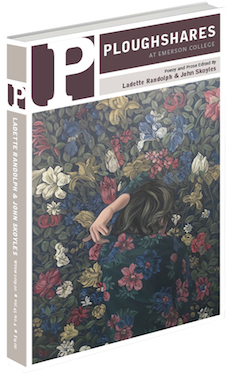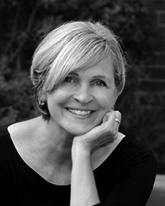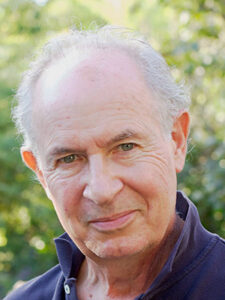a psalm in which i demand a new name for my kindred (Emerging Writer’s Contest Winner: POETRY)
In poetry, our winner is Aurielle Marie for her poem “a psalm in which i demand a new name for my kindred.”
Of her poem, poetry judge Fatimah Asghar said, “The language in this poem is incredibly unique—every line is a slight twist, a turn, a surprise at the end of the breath. The language is just so alive, so right under the skin. This poem instantly captivated me upon reading it and the imagery stayed with me long after.”
Aurielle Marie is a Black and queer poet, essayist and social strategist hailing from the Deep South. She writes and speaks urgently about hip-hop, class, race, sex, and politics from a Black feminist lens. She was selected as the 2019 Lambda Literary Poetry Writer-in-Residence. She’s received invitations to fellowship from the Lambda Literary Writers Retreat for LGBTQ writers, Tin House, VONA Voices, and the Kopkind Colony. Her poems have been featured in or are forthcoming from the TriQuarterly, The Southeast Review, Adroit Journal, Black Warrior Review, and VINYL. You can find her essays on Wear Your Voice, NBC, in Essence, Allure, and The Guardian. Follow her: @YesAurielle
When did you first realize you wanted to be a writer?
I don’t know that there was a particular moment I realized I wanted to be a writer. I think more honestly, I looked up one day, when I was quite young, to realize that I had taken up writing as a sort-of grief practice. My brother died, and I wrote for him, or, maybe, toward him. My family lost our home, and in the shuttling to stay with cousins or extended family, I never let go of my journals. I was in a writing practice, and it became crucial to my survival. The moment I realized I was a writer, though, that’s easy. It began August 9, 2014. The day Michael Brown was murdered by a police officer in Ferguson, MI. I was tweeting and writing essays and poems about the lived experiences of Black youth in America as I organized in our communities. I realized how badly I wanted my writing to pursue a goal beyond my own quiet toiling, and so my poetry and essays began to reflect that charge.
What is your writing process like?
Well, I’m a Sagittarius, so it can be hard sticking to one routine. Instead of forcing more structure, I try to make my spontaneity into a discipline. I bring notepads to bars and coffee shops because my phone will absolutely die at some point, and I don’t want to forget conversations I overhear. I scribble on sticky-notes during dates. I spend three hours talking to friends about the rigor of regional ebonics, or African American Vernacular. Then when my head is full, I braindump/purge. Sometimes it barely lasts ten minutes, and other times I crank out five or six different first drafts in one sitting. All of this freedom on the front end is coupled with a pretty rigorous editing process, where I try plugging the drafts into different forms, or using prompts as editing tools, etc. I used to hate editing, but now my free-write to final draft process feels adventurous, which of course I love.
What inspired “a psalm in which i demand a new name for my kindred?”
It’s been rewarding to write about the lived experiences of marginalized folks who share my identities. But, I sometimes found myself caught in despair and fatigue as I wrote about trauma and state violence, especially in this political climate. After a particularly hard essay, I stepped back from the work like “Wait a minute, why is all this so sad? I love being Black! I love being queer! I rep the South hard! I need to put the joy back into what I’m writing!” I can’t think of a more foundational part of my identity than my community. I have the privilege of being in friendship with some of the most brilliant, magical people I’ve ever known. I wouldn’t be here without them. They deserve all my poems. Throughout the piece, I took care to use language that clarified who my kindred are. Not colleagues, not just friends or lovers, but my meat, a majestic selfishness, my broke ass friend. Any reader may be able to guess that my friends are Black and our love is Black, but only my kindred know how I almost drowned at Mozley Park, how I put too much blue grease in my hair, how I was the only one in the waiting room when they went for an abortion. And how magical is it to have written a love poem that is only for them, that is known, too, by the world? Man, I love them.
Who are you reading? And who informs your work?
I believe James Baldwin when he said “The duty of the artist is exactly the same as the role of the lover. If I love you, I have to make you conscious of the things you don’t see.” I’m forever learning from artists who do this in their work. I’m never not reading Poetry for the People by June Jordan. Sula and Beloved by Toni Morrison are always close by, as well as her essays on craft. Morrison teaches us so much about the dexterity of language, all its possible iterations, and how to write toward a Black audience with stories that are both universal and unmistakably ours. Octavia Butler, Zora Neale Hurston, and Alice Walker are writers who I take cues from. Patricia Smith, Terrance Hayes, Kiese Laymon, Camoghne Felix, Tiana Clark, and Ilya Kaminsky too. I think I have to mention that I wouldn’t be writing if Danez Smith didn’t exist in this world, writing as a queer/genderqueer Black poet with hood slang on the line alongside more “traditional” language. I’m forever grateful to them, and to all these writers, for being models for me.
Do you have any advice for new writers?
The best advice I’ve gotten is “the best writers are the best readers.” Read, read, READ! Additionally, I’ve heard it said before, that writing is “fearless storytelling.” I don’t agree. I don’t think writing is about being fearless. I think fear is valuable, is an undeniable part of storytelling, especially in marginalized communities. What does it mean, then, to be a writer who acknowledges your fear? Be a writer, humanly fearful, and audacious despite it.
What projects are you working on now? Where is your writing headed?
I’ve (finally!) completed my manuscript Gumbo Ya Ya. It attempts to unveil the complexity of Black gxrlhood and Black queer gxrlhood, particularly in the South, but it also takes a stab at embodying the page, of positing an intersectionally marginalized identity as the center of the universe, and exploring what it means to be speaking from the middle and not the margins. While working on getting that manuscript out into the world, I’m also working on a collection of essays, on sex and bodies and technology—think, the mood of the movie Ex Machina, meets the hit series Girlfriends…But like, southern—which I’ll be chipping away at while I complete my MFA. I’m also really interested in exploring the rigor and dynamism of Ebonics/AAV, which is to say I want to write in my mother tongue—Southern dialects of creole or Ebonics, and will be investing more of my research and writing in the profound legacy of that, not unlike poetic greats Patricia Smith, and so many others.
*
after Danez Smith
you caught a bitch in her early nude, paper
thin psalms sharpened into blades on her mother’s
lawn, what a mess and you loved her fiercely
not unlike a salvation of noise, your broke ass
hands the arithmetic of Five Points
the library dust in your bones my favorite
poem running over a cliff my dark
bloody muse, my nigga, i love you
in the worst way, i mouth pomegranate
in gummy bliss, kernels falling like manna
into your lap, i milk honeysuckle and your belly
swells with child, you are mine
your youngest born an other
me, your blood pooled beneath his skin, you spit
and we puddle into pink chlorine at Mozley Park
you are my magic, the wicked
Sunday morning song i scythe
from my mother’s hair like hot
oil in your kitchen we feast
we commune, bitch you my whole lyric
ain’t i said it enough, that you love
like an orange? i pull you from the vine and weep
at how many times you can halve in my
palm and not slip away bitch, you tender
me you give me better language for my
broken you don’t pretend to fix i love you
into some better hymn, you the whole soup
you the roux of me, my solemn chew my nigga
you the gristle, i love you the bone splinter
i love you the gum ache, i love you the jigsaw sweat
the deep sigh the belly slick the muscled
sprint from sun to dusk, you the star
i follow to rid myself the Mason Dixon
i line you up over my father’s toilet,
when i bleed you gather my family to pray
when i pray you beckon my mother’s god
to listen, my god, my best friend i love you,
i love you and am alive
to witness you be this great iteration this majestic
selfishness bitch you give me
my me back, you give me my meat, you give me
enough food to fill my plate my mama
say she got 12 kids and birthed only three
i wish this holy multiplication upon our children
our thick-headed young, a legion of fool ass saints
linked by the hip of their own names
together, long after we dead


